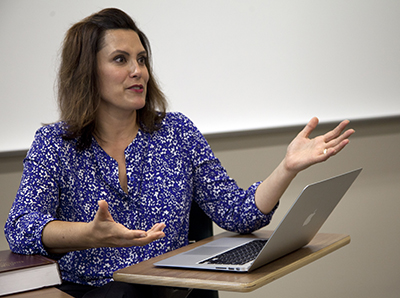
When former Michigan state legislator Gretchen Whitmer was contacted by Lisa Fine, co-director of the MSU Center for Gender in Global Context, about teaching course WS 404, Women and the Law in the United States, Whitmer readily agreed.
Term-limited in December 2014, Whitmer served three two-year terms in the House, and two four-year terms inthe Senate, and was Democratic leader her final term. She notes that while the Gender and the Law course purpose is “to educate students about what our rights are under the law and how much more there is to be done,” it’s been an eye opener for her, too.
“This has truly been an education for me,” Whitmer says. “I‘ve enjoyed it thoroughly. The students are so energetic, and interested, and engaged in a way I don’t recall them being when I was a student.”
Whitmer says this may be due in part to class make-up. From those interested in gender issues, the law or law enforcement, to criminal justice and gender studies majors, it runs the gamut. There are eight students—all women—in the class, Whitmer’s first as a teacher.
It’s been surprising for all of us to see how far women have come, and yet how far we have to go to be equal under the application of the law.
GRETCHEN WHITMER
Junior Sarah Hehrer, a dual Women’s Studies and James Madison major, says Whitmer’s class is the fourth or fifth Women’s Studies course she’s taken.
“I do eventually want to go into non-profit management, possibly having to do with reproductive rights,” Sarah says. “So, I thought this class would go really well with my majors. It’s great having Gretchen Whitmer teach us, and it’s nice to have a small class. We get to know her, and she gets to know us.”
Whitmer agrees, saying, “Listening to students talk about ‘privilege’ and how they think about societal differences, and how the law impacts different people in different ways is so impressive. And, it’s made me a better communicator. When a lot of case law is assigned for class, I sometimes go to the white board and try to draw it out for the class so they see it better, because they’re not law students, although some may be in the future.”

Sarah seconds that, “I’ve always considered law school as a possible option. I particularly like the technical side of the law. Things like the different levels of discrimination, and the ways you have to prove you’ve been discriminated against whether gender-based or ‘within reason.’ That’s interesting to me.”
Says Whitmer, “It’s sometimes challenging, but they do the work and they come prepared to discuss and apply. And it’s been surprising for all of us to see how far women have come, and yet how far we have to go to be equal under the application of the law.”
Referencing the legislative arena, Whitmer says that whether talking about the law, education, pay equity, access to healthcare—or other historical women’s struggles— their status has much to do with there not being enough women engaged in the debate where decisions are being made.
“During my 14 years in the Michigan legislature, the numbers of women went down every year,” Whitmer says. “When I came to the Senate, we had an historic high of 12 women. The very next election, the number went down to 8, and the election after that, four. There were more men named John in the Senate at the start of the last session than women.
We need to listen to women. We need to listen to patients. We need to listen to doctors. We need to listen to the people impacted by our laws.
GRETCHEN WHITMER
Whitmer adds that, as a result, you begin to understand why we get laws like “rape insurance,” because there’s not always someone in the room saying, ‘We need to listen to women. We need to listen to patients. We need to listen to doctors. We need to listen to the people impacted by our laws.’
She notes that it’s not just the state legislature where low numbers of women are an issue. The Crain’s Detroit Business List of the Top 50 Businesses in Michigan lists only one woman in the top slot, and that’s GM.
Whitmer believes this is a prime reason we still see issues like workplace discrimination, pay equity, and lack of childcare and support for women coming back into the workforce after giving birth.
Says Sarah, “Gretchen’s personal experience is great to have,” Sarah says. “She tells a lot of personal stories, and it’s a really good look into what life would actually be like as an elected official. That’s exciting to hear about.”
Noting that all of the above dovetails into “This generation doesn’t see people differently based on where they come from, what their gender is, what their religion is, what their race is. It’s very encouraging. It’s unfortunate that our legislatures take so long to catch up. But I’m optimistic.”the law being studied in her Women and the Law in the United States course, Whitmer adds. “One of the things I love most about being in the classroom is seeing how this younger generation views the world.


